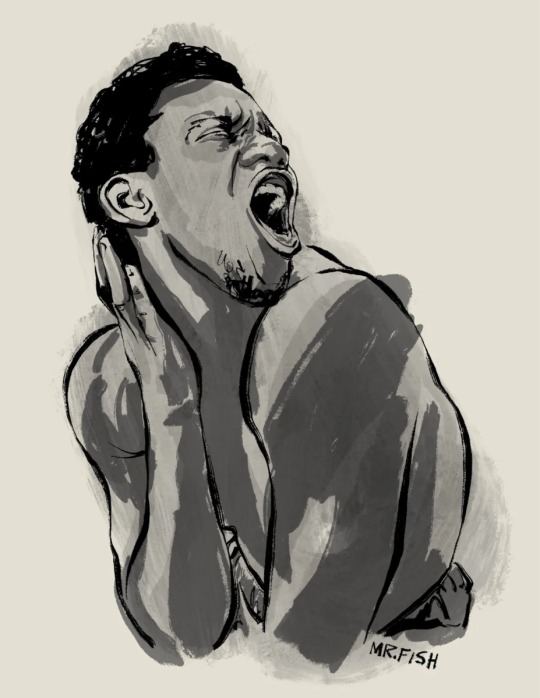#Rosa luxemberg
Quote
Credit not only aggravates the crisis in its capacity as a dissembled means of exchange, it also helps to bring and extend the crisis by transforming all exchange into an extremely complex and artificial mechanism that, having a minimum of metallic money as a real base, is easily disarranged at the slightest occasion.
Rosa Luxemburg, Reform or Revolution
#Rosa luxemberg#reform or revolution#socialism#revolutionary#economics#credit#financial crisis#economic crisis#feels relevant
20 notes
·
View notes
Text
“Order prevails in Warsaw!” declared Minister Sebastiani to the Paris Chamber of Deputies in 1831, when after having stormed the suburb of Praga, Paskevich’s marauding troops invaded the Polish capital to begin their butchery of the rebels.
“Order prevails in Berlin!” So proclaims the bourgeois press triumphantly, so proclaim Ebert and Noske, and the officers of the “victorious troops,” who are being cheered by the petty-bourgeois mob in Berlin waving handkerchiefs and shouting “Hurrah!” The glory and honor of German arms have been vindicated before world history. Those who were routed in Flanders and the Argonne have restored their reputation with a brilliant victory – over three hundred “Spartacists” in the Vorwärts building. The days when glorious German troops first crossed into Belgium, and the days of General von Emmich, the conqueror of Liege, pale before the exploits of Reinhardt and Co. in the streets of Berlin. The government’s rampaging troops massacred the mediators who had tried to negotiate the surrender of the Vorwärts building, using their rifle butts to beat them beyond recognition. Prisoners who were lined up against the wall and butchered so violently that skull and brain tissue splattered everywhere. In the sight of glorious deeds such as those, who would remember the ignominious defeat at the hands of the French, British, and Americans? Now “Spartacus” is the enemy, Berlin is the place where our officers can savor triumph, and Noske, “the worker,” is the general who can lead victories where Ludendorff failed.
from 'Order Prevails in Berlin', Rosa Luxemberg, 1919
The volunteer paramilitary Freikorps had just attacked the headquarters of the newspaper Vorwärts, which the communist Spartacus League had peacefully occupied ten days prior, killing at least one hundred.
A few hours after publishing this, Rosa herself was taken into custody and executed by firing squad.
1 note
·
View note
Quote
Wanneer de hele wereld uit haar voegen raakt, dan tracht ik alleen maar te begrijpen, wat en waarom het gebeurd is en als ik mijn plicht heb gedaan, ben ik weer rustig en goedgeluimd. Het volledig opgaan in de ellende van de dag is voor mij onverdraaglijk. Denk eens aan Goethe wat hij moest meemaken, die onafgebroken keten van oorlogen, waarin de wereld er als een losgeslagen gekkenhuis uitzag, en hoe rustig en met welk een sereniteit hij zich verdiepte in zijn studie en poëzie. We moeten ons slechts nog meer aaneensluiten, opdat het 'warmer' wordt.
0 notes
Text
i have to write a *brief* essay on early european socialism and im trying so fucking hard not to be overenthusiastic about rosa luxemburg
#studyblr#essay writing#history class#socialism#leftism#leftist#anarchism#marxism#rosa luxemburg#luxemberg#feminism#marxist feminism#zetkin#clara zetkin#spd
4 notes
·
View notes
Text
People like Mother who possess a Heaven-given education–the words are peculiar I know–may perhaps be able to welcome a revolution in a surprisingly matter-of-fact way, as a quite natural occurrence. Even I found some things objectionable when I read Rosa Luxemberg’s book, but, given the sort of person I am, the experience on the whole was one of profound interest. The subject matter of her book is generally considered to be economics, but if it is read as economics, it is boring beyond belief. It contains nothing but exceedingly obvious platitudes. It may be, of course, that I have no understanding of economics. Be that as it may, the subject holds not the slightest interest for me. A science which is postulated on the assumption that human beings are avaricious and will remain avaricious through all eternity is utterly devoid of point (whether in problems of distribution or any other aspect) to a person who is not avaricious. And yet as I read this book, I felt a strange excitement for quite another reason–the sheer courage the author demonstrated in tearing apart without any hesitation all manner of conventional ideas. However much I may oppose morality, I am powerless to prevent the image floating before my eyes of the wife of the man I love, coolly and quickly hurrying back to his house. Then my thoughts turn destructive. Destruction is tragic and piteous and beautiful. The dream of destroying, building anew, perfecting. Perhaps even, once one has destroyed, the day of perfecting may never come, but in the passion of love I must destroy. I must start a revolution. Rosa gave tragically her undivided love to Marxism.
–Osamu Dazai, The Setting Sun (Trans. Donald Keene)
#i've never read rosa luxemberg but i thought this was interesting#osamu dazai#the setting sun#quote
2 notes
·
View notes
Text
🇵🇸Will Joe Biden be the first American president to lose an election over Palestine?
🏴Should Rishi Sunak’s government, which was not elected to govern, decide that your money is going to be used to kill Palestinians?
⛓️“Those who do not move do not notice their chains.” Rosa Luxemberg.
‼️Take to the streets. If not now, then when?
#palestine#gaza#free palestine#israel#jerusalem#i stand with palestine#فلسطين#free gaza#israel is a terrorist state#israeli war crimes
1K notes
·
View notes
Text
From the uppermost summit of the state down to the tiniest parish, the proletarian mass must therefore replace the inherited organs of bourgeois class rule—the assemblies, parliaments, and city councils—with its own class organs—with workers’ and soldiers’ councils. It must occupy all the posts, supervise all functions, measure all official needs by the standard of its own class interests and the tasks of socialism. Only through constant, vital, reciprocal contact between the masses of the people and their organs, the workers’ and soldiers’ councils, can the activity of the people fill the state with a socialist spirit.
The economic overturn, likewise, can be accomplished only if the process is carried out by proletarian mass action. The naked decrees of socialization by the highest revolutionary authorities are by themselves empty phrases. Only the working class, through its own activity, can make the word flesh. The workers can achieve control over production, and ultimately real power, by means of tenacious struggle with capital, hand-to-hand, in every shop, with direct mass pressure, with strikes and with the creation of its own permanent representative organs.
Rosa Luxemberg, “What Does the Spartacus League Want?,” in The Rosa Luxemburg Reader, ed. Peter Hudis and Kevin B. Anderson (New York: Monthly Review Press, 2004), 351.
1 note
·
View note
Text
AMERIKA: 'Cultural Hegemony', They Crush Our Song For A Reason - By Chris Hedges
AMERIKA: ‘Cultural Hegemony’, They Crush Our Song For A Reason – By Chris Hedges
Source – scheerpost.com
“….W.E.B. Du Bois argued that white society feared educated Blacks far more than they feared Black criminals…Those, like Du Bois, who was blacklisted and driven into exile, who pull the veil from our eyes are especially targeted by the state. Rosa Luxemberg. Eugene V. Debs. Malcolm X. Martin Luther King. Noam Chomsky. Ralph Nader. Cornel West. Julian Assange. Alice…

View On WordPress
1 note
·
View note
Photo

L'8 marzo non è legato alle operaie morte nel 1908: la storia del Giorno della donna (...) È un falso storico la credenza che la giornata della donna fosse legata alla morte di numerose operaie in un incendio avvenuto l'8 marzo 1908 in una fabbrica tessile di New York. Mai è stata trovata traccia documentale di questo incendio mentre ce ne fu uno in cui morirono molte donne, il 25 marzo 1911, sempre in una fabbrica newyorkese e non correlato alla ricorrenza. (...) L'idea di una giornata internazionale della donna nasce nel febbraio del 1909 negli Stati Uniti, su iniziativa del Partito socialista americano. L'anno seguente, nel 1910, la proposta venne raccolta da Clara Zetkin e Rosa Luxemberg a Copenaghen, durante la Conferenza internazionale delle donne socialiste e si istituì una giornata per rivendicare i diritti delle donne. La data dell’8 marzo non sarà fissa in tutti i paesi fino al 1921. PERCHE’ NASCE La festa della donna nasce come un giorno di rivendicazione e di lotta per i diritti delle donne: suffragio femminili, denuncia dello sfruttamento della manodopera femminile, denuncia della discriminazione sessuale subita dalle donne. LE MANIFESTAZIONI STORICHE 1914 - L’8 marzo in Germania si tenne la prima grande manifestazione per il diritto di voto alle donne. 1917 - L'8 marzo (23 febbraio per il calendario giuliano) le donne di San Pietroburgo scesero in piazza dando avvio alla rivoluzione russa che mise fine al potere zarista. RICONOSCIMENTO ONU 1977 – Con risoluzione 32/142, l’Onu riconosce l’8 marzo come “Giornata delle Nazioni Unite per i diritti delle Donne e per la pace internazionale”. Da allora in ogni Paese questa data è l’occasione per ricordare tutte le battaglie combattute, vinte o ancora da vincere per la difesa e la valorizzazione della donna”. L’8 MARZO IN ITALIA La prima giornata per i diritti delle donne si tenne nel 1922 su iniziativa del movimento socialista, durante il regime fascista la giornata delle donne venne abolita. L'8 marzo 1945 l'UDI (Unione Donne Italiane) ristabilì la giornata delle donne nell'Italia libera dai nazi-fascisti per il riconoscimento dei diritti economici, sociali e politici delle donne, scegliendo la mimosa come simbolo della giornata. Da fine anni ’60 e per tutti i ’70 la giornata delle donne si caricò di significati politici e civili: parità salariale, divorzio, legalizzazione aborto, libertà sessuale. LE MANIFESTAZIONI STORICHE ITALIANE 1972 - Campo de’ Fiori a Roma. Non fu casuale la scelta dell’unica piazza della Capitale senza una chiesa e dove nel 1600 fu arso vivo Giordano Bruno, filosofo eretico che non chinò mai la testa nemmeno nel momento della sentenza. Erano gli anni della lotta femminista e l’8 marzo scesero in piazza più di 20mila donne a difendere il divorzio appena ottenuto e vivere la sessualità in tutta libertà. Mentre molti uomini si avvicinavano alle contestatrici per lanciare sberleffi o insulti, urlando: “A casa! Le donne devono stare a casa!”, oppure: “Dai bambine, ora tornate sul marciapiede”, la polizia decise di fare la prima carica su una manifestazione al femminile del dopoguerra. L'8 MARZO OGGI Nel 2017 la festa della donna ha acquisito nuovamente una grande forza simbolica grazie al movimento "Non una di meno", nato in Argentina e presto diffusosi nel mondo per la denuncia delle violenze di genere, dei femminicidi, delle disuguaglianze di genere. a cura di M. Cec. Globalist
13 notes
·
View notes
Quote
After having (as a factor of the process of production) provoked overproduction, credit (as a factor of exchange) destroys, during the crisis, the very productive forces it itself created. At the first symptom of the crisis, credit melts away. It abandons exchange where it would still be found indispensable, and appearing instead, ineffective and useless, there where some exchange still continues, it reduces to a minimum the consumption capacity of the market.
Rosa Luxemburg, Reform or Revolution
#Rosa luxemberg#socialism#revolutionary#anti-capitalist#reform or revolution#politics#political quotes#economics#credit
4 notes
·
View notes
Text
was the treaty of versailles the most significant problem the weimar faced?
The Treaty of Versailles created a lot of problems for the Weimar government because they had to accept all blame and responsibility for the war. Their army was limited to 100,000 soldiers, no submarines or planes and only six battleships. The rhineland was completely demilitarised for Germany. They were forced to pay £6,600 million in installments, which completely ruined their economy, worsened by a loss of 13% of her land.
Enemies of the government began to create myths such as the Stab in the Back Theory, which spread anger towards the Weimar. The theory was that Germany had only lost the war because they had been “stabbed in the back” by politicians because their defeat had been so unexpected, despite the clear evidence that the country just could not go on fighting.
The country was in political unrest. Germans hated the Weimar for signing the treaty, despite having been forced to. Due to this resentment, the Weimar faced political uprising from both polars of the political spectrum. On the left, there was notably the Spartacist Uprising, which was a party of communists who rebelled in Berlin. They were led by Karl Liebknecht and Rosa Luxemberg in January of 1919. On the right, many white supremacists and nationalists were uprising, including the Munich Putsch, performed with Adolf Hitler.
Proportional representation was when each party had a percentage of seats based on how many votes they received in the elections. There were many small parties which made it difficult to pass laws, leading to a weak and short lived government. It was fair, but they were not equipped to deal with the problems the treaty presented to them.
After hyperinflation caused by the treaty, people were angrier than ever. They had suffered a lot due to the economy’s collapse. This made them weak and vulnerable to manipulation. Hitler told them he would liberate the German people from the treaty and made them think that Jewish politicians had betrayed them. This created an easy route for Hitler to get into power, with the Munich Putsch giving him more fame and recognition as a hero, rather than the dictator he would become.
Overall, I believe that the Treaty of Versailles was the most significant problem because it led to many other things which made the Weimar weaker and weaker until it collapsed. It assisted Hitler into becoming chancellor and had the German people starving under hyperinflation from 1919 until 1923.
#the treaty of versailles#1920s#1920s germany#hyperinflation#nazis#history#the weimar#punk academia#dark academia#history gcse
18 notes
·
View notes
Text
Never forget the Porajmos - the genocide of over a million Romani people by the Nazis.
Never forget the Farhud, a Nazi-inspired pogrom in Iraq, 1941.
Never forget the Nazis also killed Sephardi and Mizrahi Jews.
Never forget Aktion T4, the so-called “mercy killings” (genocide) of those called “useless eaters” (disabled people).
Never forget that this policy of eugenics was directly inspired by the USA’s eugenics movement and purposefully exported there.
Never forget that the parents of the first disabled child killed in Aktion T4 wanted their child dead.
Never forget the hundreds of Black Germans who were forcibly sterilised by the Nazis.
Never forget the “inverts” and “homosexuals” who were rounded up and sent to their deaths because they were deemed a threat to the “Aryan Race.”
Never forget the “nice Germans” who didn’t “care about politics” and silently watched their neighbours be taken away to be tortured and killed.
Never forget the Resistance.
Never forget the anti-fascists and the Partisans who were of many nations, including Jews, who fought the Nazis and rescued concentration camp survivors.
Never forget the Warsaw Ghetto Uprising, an armed resistance of Jewish people that saved thousands of lives from the concentration camps.
Never forget the smaller acts of resistance like industrial sabotage practiced by those in the concentration camps to reduce their contribution to the Nazi war machine.
Never forget the communists, anarchists, trade-unionists, and other radicals who opposed Nazism and who were incarcerated and killed.
Never forget the Danish gentiles who saved 90% of its Danish Jewish population of 7,000 while under years of Nazi occupation.
Never forget that the United States of America’s xenophobic, racist, eugenicist, antisemitic, ableist, and anti-Romani immigration quotas policy condemned millions of people to death.
Never forget the fate of the M.S. St. Louis.
Never forget that Nazism was fairly popular in the USA until Germany declared war on it.
Never forget that antisemitism persisted during that time and was heightened during the McCarthyism.
Never forget the Sozialdemokratische Partei Deutschlands (Social Democratic Party of Germany) who violently suppressed political radicals (including killing the Jewish communist Rosa Luxemberg and other members of the KPD) during the Wiemar Republic, inadvertently aiding the Nazis.
Never forget that this and their “lesser of two evils” strategy led Hitler to become Chancellor.
Never forget Magnus Hirschfeld, a sexologist, Homosexual Transvestite*, and German Jew and his Institut für Sexualwissenschaft (Institute for Sexual Science). *his own terms
Never forget that the Nazis burned it and all the works in his library.
Never forget the “Masculunists” (the forerunner of today’s “homonationalists”), their hatred for Magnus Hirschfeld, and their support of the Nazis who later betrayed them in the Night of Long Knives after using them like the tools they were.
Never forget Willem Arondeus, a Dutch Homosexual gentile artist, writer, and resistance leader who led a group in bombing the Amsterdam Public Records Office on July 1st 1943 in order to hinder the Nazi round-up of Jews.
Never forget his final words: “Let it be known that homosexuals are not cowards.”
Never forget Chiune Sugihara who saves tens of thousands of Lithuanian Jews by disobeying orders and giving them (often false) visas.
Never forget that the city of Shanghai brought in tens of thousands of Jews, more than any USA city.
Never forget the USSR, not the USA or Britain, liberated most of the concentration camps and captured Berlin, ending the war.
Never forget the Japanese-Americans who liberated Dachau that USA textbooks never mention.
Never forget the Kapos.
Never forget that the world knew.
Never forget all the Holocaust survivors who escaped the concentration camps and arrived in Britain, the USA, and the USSR and told the world their stories.
Never forget the silence.
Never forget that the entire chain of command for the USA, including President Roosevelt, ordered the air force not to bomb the railways leading to Auschwitz and the gas chambers which would have saved thousands.
Never forget that it was the Tuskegee Airmen – a racially segregated, all-Black division – that disobeyed orders and bombed the railways to Auschwitz.
Never forget that Hitler’s plans of genocide were inspired by the United States of America’s genocide of its Indigenous Peoples.
Never forget Henry Ford and all the other American Nazi-collaborators.
Never forget the pogroms just after the Holocaust officially ended.
Never forget that never again means never again to anyone.
Never forget the betrayal.
Never forget the solidarity.
Never forget that “first they came for the Socialists.”
Never forget that an injury to one is an injury to all.
57 notes
·
View notes
Note
🔥 rosa luxemberg
underhyped as one of the only people that seemed to understand what marx was doing in capital tbh
27 notes
·
View notes
Quote
The most revolutionary thing one can do is always proclaim loudly what is happening.
Rosa Luxemberg
6 notes
·
View notes
Text
October 2, 2019
“Those who do not move, do not notice their chains” - Rosa Luxemberg

Brandon Gonzalez. 18. SUNY Oswego Freshman.
HoOZ: What is your biggest strength?
Brandon: In contrary to my fear, it kind of contradicts sometime, but my biggest strength is the ability to maneuver in a situation. Not so much code switch, but being able to understand and assess a situation and how I should adapt to it. I feel like that is a strength because it gives me a sense to approach any situation, ask some questions: why they act and behave in that way, why they think the way they think. And I believe that is a strength, being able to deeply analyze a situation and get a sense of people but, like I said it kind of contradicts my flaw. So instead of truly being myself sometimes, I’ll just read people and see what I should do and how I should perform in a situation. If you think about, all human interactions are performances, everything you do is a performance. You’re only truly yourself with one individual sometimes, barely even that, and sometimes you are not yourself with yourself.
HoOZ: What is your biggest weakness?
Brandon: My biggest flaw would be fear. Existing as a queer person of color, I often times place my paranoia over my confidence instead of remaining unapologetically true to myself. I would sometimes isolate myself and worry, which is valid but I preach unapologetic, you know? The notion that you should “be you” but, it is like - how can I be me when other people don’t want me to be me. I feel like that would be my biggest obstacle.
HoOz: Where do you see yourself in 5-10 years?
Brandon: In 5-10 years, I see myself getting my PhD in education, and I also see myself being a political leader - maybe not just in America but anywhere really. I see my establishing myself as a leader that is not to be toyed with, as someone who is influential both - worldly and nationally. I see myself as someone that has the potential to have the tools and resources to provide those resources to people who have long been historically marginalized - people of color, queer identifying people, etc. Essentially, people who do not have access to those resources. My goal is to keep grassroots, grassroots. Start a group, and I would not call it a foundation, NGO, Non profit, etc but a group where people can talk to other groups of people and just have human interactions. Instead of searching for money by digging in politicians pockets for unbroken promises. My type of political activism is influenced by non-western thought and very extreme leftist practices in politics. Like theories such as the black panther party and the young lords. I take a lot of inspiration from my liberators of the past and their trials and tribulations as well as, a lot of socialistic and anarchist thoughts only because you can dig into liberation and form what that may or may not look like. I believe you have to be open to and read every other opinion, you can not just stick to one view. And my focus is influenced by all of my inter sectionalizes but my target demographic is for all. Simply, I see myself providing, loving, and being happy.
HoOz: What was your biggest struggle while forming into your identity?
Brandon: It took years to work on decolonizing my mind to finally realize who I really am instead of what society deems I should be. Growing up, I knew I was bisexual, I knew I was queer, I knew I did not just like girls, I liked everyone else really. And so, I had internalized a lot of homophobia and queer-phobia because I was thinking I shouldn’t be thinking this way at all; like you are only gay or straight, and if you were gay than that sucks. I also had this notion, that all gay people had AIDS, like once you came out as that, that was what you had and you were doomed to live a life of condemnation. Also, tying that into societies perception of race; growing up and seeing black and brown kids tortured and not being able to thrive in their skin, even in western societies, and looking at the world in Afghanistan and Iraq, then looking at the world seeing middle eastern kids suffer because of something that did not do. Also, looking at Trayvon Martin - we were around the same age and that could of been any of my friends, or me, or anyone I knew in my neighborhood. So, the current events of death and violence and micro-aggression, that I didn't necessarily know but things I considered the truth because the news said it, which means there is no rebuttal therefore, it is a fact and in return I internalized all of that. It took a lot of years to unlearn that and recognizing that this isn’t all that it is; everything you see isn’t all that you are really seeing.
HoOz: If you can tell your future self one thing what would it be?
Brandon: If I can tell my future self one thing, it will be to not be brought. Do not buy into anybody's ideas, feelings, or perceptions about you, anything really and just focus on your truth, your community. Focus on your BullS***t.
HoOz: What is your advice to someone who is afraid to be open about who they are?
Brandon: I personally know a lot of people who are down low, and it is important to speak to them and understand why they are in the“closet” - I had to understand why I was in the closet for a while. And it's due to violence in coming out. Having to be forced to come out of an imaginary closet, that whole action in itself is a violent act. We shouldn’t have to confronted about our identities we should just be us and exist without having to think “Oh, I am this way because I am (whatever you are on the spectrum). Nobody should have to “come out” and I think that is one of the first reasons why people want to stay in the closet. So for someone who is afraid to be themselves and that could be in any way shape or form: race, sexuality, anything...Know who you are - that is really all you need to do. I walk around this campus wearing crop tops , and I do not care a single bit. And if anybody hates me or feels that need to touch me, their behavior is a reflection of who they are, not me because I know who I am; and I’m pretty cool so if you hating on me that just shows something is wrong with you.
1 note
·
View note
Photo









Berlin: Ten thousand people march in memory of communist martyrs Rosa Luxemberg and Karl Liebknecht, January 14, 2018.
Photos: Red Revolution, roter.wedding, PM Cheung, Julia Louise, Kerstin Wolter, Re Doc on Twitter
#LLdemo#LLL#Rosa Luxemburg#communist#Berlin#protest#Karl Liebknecht#Lenin#socialism#revolution#Germany#martry#Spartacus League#KPD#DPRK
320 notes
·
View notes